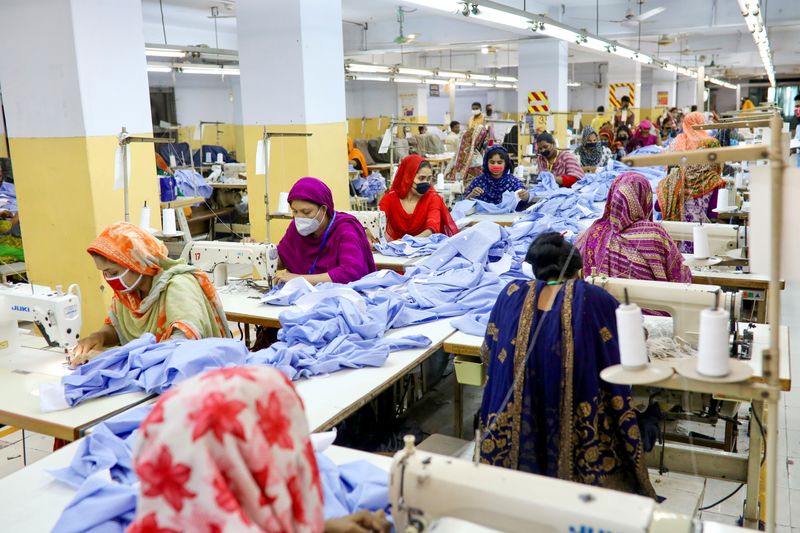(Reuters) -The current political unrest in Bangladesh is expected to disrupt the country's clothing industry, potentially affecting global apparel retailers from H&M (ST:HMb) to Zara as they head into the key holiday season.
The country has been gripped by violence since July, forcing Prime Minister Sheikh Hasina to resign on Monday and flee the country after hundreds of people were killed in a crackdown on demonstrations demanding her ouster.
Some garment factories reopened on Wednesday after they were forced to shut down under curfews.
The Bangladesh Garment Manufacturers and Exporters Association (BGMEA) said a total of four days were lost, and that it was "too early" to make an estimate of the loss.
According to the BGMEA, the readymade garment industry accounts for 83% of the country's total export earnings.
Bangladesh was the third-largest exporter of clothing in the world last year, after China and the European Union, according to data from the World Trade Organization, exporting $38.4 billion worth of clothes in 2023.
The following table shows Bangladesh's apparel export to the world:
Region July-May FY 2023-24 July-May FY 2022-23
Total export % of Total % of total
value total export export
export value
European $21.65 bln 49.4% $21.22 49.8%
Union bln
United $7.45 bln 17% $7.73 bln 18.1%
States
United $5.16 bln 11.8% $4.59 bln 10.8%
Kingdom
Canada $1.387 bln 3.16% $1.39 bln 3.26%
Japan $1.48 bln 3.3% $1.46 bln 3.4%
The following are some of the main retailers with exposure to Bangladesh:
** Swedish apparel retailer H&M sources garments from about 1,000 factories in Bangladesh, according to a supplier list on the company's website. The company said on Monday that it was "concerned about the developments (in Bangladesh)."
** Fast-fashion player Zara, owned by Spain-based Inditex (BME:ITX), has 12 manufacturing clusters where 98% of its production was concentrated in 2022, according to an annual filing. Bangladesh was one of the manufacturing clusters, the filing showed.
The company on Monday declined to comment on the impact of the political unrest on its business.
** Japan-based Fast Retailing, which owns the Uniqlo banner, sources garments from about 29 factories in Bangladesh.
** Clothing retailer Primark, owned by Associated British Foods (OTC:ASBFY), sourced from 113 factories in Bangladesh as of Oct. 2023, the company's website showed.
** Retailer Canadian Tire had about 50 suppliers in Bangladesh as of June 2023, according to a list on the company's website.
** French retailer Carrefour (EPA:CARR) sourced from 59 textile factories in Bangladesh in 2022, according to a list on the company's website.
** Among U.S. apparel makers, VF Corp (NYSE:VFC) has 49 company-owned facilities in Bangladesh, according to the company website. Levi Strauss (NYSE:LEVI) has 33 facilities in Bangladesh according to the company's website.
** U.S. big box retailer Target has about 80 factories in Bangladesh, according to a public list from the company.
** Fruit of the Loom, a Berkshire Hathaway (NYSE:BRKa) unit, has seven suppliers in Bangladesh, as per the company's website.

** Kate Spade-owner Tapestry (NYSE:TPR) has two tier-1 suppliers in Bangladesh, as per a list available on the company's website.
Source for export figures: BGMEA